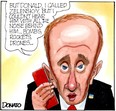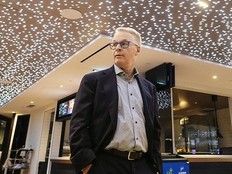U.S. approves world’s only twice-a-year shot to prevent HIV transmission

Article content
WASHINGTON — The U.S. has approved the world’s only twice-a-year shot to prevent HIV, the first step in an anticipated global rollout that could protect millions — although it’s unclear how many in the U.S. and abroad will get access to the powerful new option.
While a vaccine to prevent HIV still is needed, some experts say the shot made by Gilead Sciences — a drug called lenacapavir — could be the next best thing. It nearly eliminated new infections in two groundbreaking studies of people at high risk, better than daily preventive pills they can forget to take.
“This really has the possibility of ending HIV transmission,” said Greg Millett, public policy director at amfAR, The Foundation for AIDS Research.
Condoms help guard against HIV infection if used properly but what’s called PrEP — regularly using preventive medicines such as the daily pills or a different shot given every two months — is increasingly important. Lenacapavir’s six-month protection makes it the longest-lasting type, an option that could attract people wary of more frequent doctor visits or stigma from daily pills.
But upheaval in U.S. health care — including cuts to public health agencies and Medicaid — and slashing of American foreign aid to fight HIV are clouding the prospects.
Millett said “gaping holes in the system” in the U.S. and globally “are going to make it difficult for us to make sure we not only get lenacapavir into people’s bodies but make sure they come back” twice a year to keep up their protection.
Gilead’s drug already is sold to treat HIV under the brand name Sunlenca. The prevention dose will be sold under a different name, Yeztugo. It’s given as two injections under the skin of the abdomen, leaving a small “depot” of medication to slowly absorb into the body. People must test negative for HIV before getting their twice-a-year dose, Gilead warned. It only prevents HIV transmission — it doesn’t block other sexually transmitted diseases. Some researchers who helped test the shot advise cold packs to counter injection-site pain.
Global efforts at ending the HIV pandemic by 2030 have stalled. There still are more than 30,000 new infections in the U.S. each year and about 1.3 million worldwide.
Only about 400,000 Americans already use some form of PrEP, a fraction of those estimated to benefit. A recent study found states with high use of PrEP saw a decrease in HIV infections, while rates continued rising elsewhere.
About half of new infections are in women, who often need protection they can use without a partner’s knowledge or consent. One rigorous study in South Africa and Uganda compared more than 5,300 sexually active young women and teen girls given twice-yearly lenacapavir or the daily pills. There were no HIV infections in those receiving the shot while about 2% in the comparison group caught HIV from infected sex partners.
A second study found the twice-yearly shot nearly as effective in gay men and gender-nonconforming people in the U.S. and in several other countries hard-hit by HIV.
Ian Haddock of Houston had tried PrEP off and on since 2015 but he jumped at the chance to participate in the lenacapavir study and continues with the twice-yearly shots as part of the research follow-up.
“Now I forget that I’m on PrEP because I don’t have to carry around a pill bottle,” said Haddock, who leads the Normal Anomaly Initiative, a nonprofit serving Black LGBTQ+ communities.
“Men, women, gay, straight — it really just kinds of expands the opportunity for prevention,” he added. Just remembering a clinic visit every six months “is a powerful tool versus constantly having to talk about, like, condoms, constantly making sure you’re taking your pill every day.”
RECOMMENDED VIDEO
Gilead said the U.S. list price, meaning before insurance, is $28,218 a year, which it called similar to some other PrEP options. The company said it anticipated insurance coverage but also has some financial assistance programs.
Most private insurers are supposed to cover PrEP options without a co-pay although the Supreme Court is considering a case that could overturn that requirement. Congress also is considering huge cuts to Medicaid. And while community health centres still are an option, the Trump administration has largely dismantled HIV prevention work at the Centers for Disease Control and Prevention that would normally get the message to vulnerable populations who’d qualify for the shot, said Carl Schmid of the nonprofit HIV+Hepatitis Policy Institute.
Schmid worries the shot won’t meet its potential because “we’re basically pulling the rug out of HIV prevention and testing and outreach programs.”
Gilead also has applications pending for the twice-yearly shot in other countries. Last fall, the company signed agreements with six generic drug makers to produce low-cost versions of the shot for 120 poor countries mostly in Africa, Southeast Asia and the Caribbean. Gilead plans to make enough shots to supply 2 million people in those countries, at no profit, until the generics are available, said company senior vice-president Dr. Jared Baeten.
Winnie Byanyima, executive director of UNAIDS, said in a statement the price is still too high. If it’s unaffordable, she said, “it will change nothing.”
And HIV experts worry the arrangements Gilead has made to reduce costs in some countries leave out middle-income countries like some in Latin America.
“Everyone in every country who’s at risk of HIV needs access to PrEP,” said Dr. Gordon Crofoot of Houston, who helped lead the study in men. “We need to get easier access to PrEP that’s highly effective like this is.”













Postmedia is committed to maintaining a lively but civil forum for discussion. Please keep comments relevant and respectful. Comments may take up to an hour to appear on the site. You will receive an email if there is a reply to your comment, an update to a thread you follow or if a user you follow comments. Visit our Community Guidelines for more information.